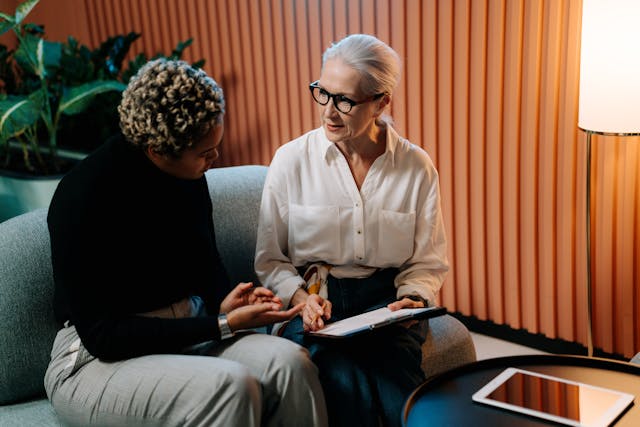10 Ways to End a Conversation With Anyone

You’ve probably found yourself in a situation where you’re stuck in a conversation and you really need to get out of it, but you don’t want to come across as rude or disrespectful. Whether you’re at a party, a work event, or even chatting with a friend, knowing how to end a conversation gracefully can be an art form. Sometimes it’s because you need to go, other times it’s because the conversation has simply run its course.
Let’s face it—awkward silences or too much small talk can be draining, and you don’t always want to stay in a conversation just because someone else is eager to keep talking. Thankfully, there are polite, respectful, and even humorous ways to end a conversation without causing offense or making things uncomfortable.
Here are 10 ways to end a conversation with anyone, without any weirdness or drama. These tips will help you navigate social situations with ease, whether it’s at a work meeting, a coffee shop, or a gathering with friends.
1. Use the “Time Check” Trick
This one’s a classic—and it’s also one of the easiest ways to wrap things up politely. The simple act of checking the time and subtly referencing it is a great excuse for ending a conversation. It’s kind of like saying, “Hey, I’ve really enjoyed this chat, but I’ve got stuff to do.”
Why It Works:
- Time is universally understood as a valid reason for leaving. People get it—sometimes you just have to go.
- It’s non-confrontational because you’re not blaming the person for the conversation being over; you’re just acknowledging the time and your commitments.
How to Do It:
A subtle way to do this is by checking your watch or phone (without doing the dramatic “checking-the-time” move) and saying something like:
- “Wow, I didn’t realize it was getting so late! I’ve got to run to my next thing, but this was great catching up.”
- “I see I’m running out of time here. I need to get going, but we should talk again soon!”
Not only are you creating a natural exit, but you’re also subtly reaffirming that you enjoyed the conversation and leaving with respect.
2. Express Gratitude and Exit
Being grateful is always a good approach. If the conversation was pleasant but you’re ready to leave, expressing appreciation is a great way to end things on a positive note. It’s all about creating a positive exit that makes the other person feel valued.
Why It Works:
- It shows that you acknowledge the interaction and appreciate the person’s time.
- It removes any awkwardness because you’re focusing on the good stuff and leaving on a high note.
How to Do It:
- “Thanks so much for chatting with me! I really enjoyed hearing about your weekend. I’ve got to head out now, but let’s catch up again soon.”
- “This was really fun, thanks for sharing your thoughts. I need to get going, but I’ll talk to you soon!”
By expressing gratitude, you also set the tone that you’ve enjoyed the conversation, even though it’s time to leave. No one likes the feeling of being cut off abruptly, so a little acknowledgment goes a long way in keeping the conversation respectful.
Don’t Miss: 10 Cheat Codes I Wish I Knew at 30
3. The “I Have to Get Going” Approach
Sometimes, you need to be direct—without being rude, of course. If the conversation is dragging on and you’ve tried subtle hints, it’s okay to just let the person know you need to leave. A straightforward approach is fine when it’s done politely.
Why It Works:
- It’s clear and direct, so there’s no guessing or miscommunication.
- People appreciate honesty, especially if it’s framed kindly. You’re not just saying “I have to leave”; you’re giving them a concrete reason.
How to Do It:
- “I really have to get going now, but this was great. Let’s talk more soon!”
- “I’ve enjoyed our chat, but I’ve got a meeting to run to. I’ll catch up with you later!”
This is one of those times when being brief is key. You don’t have to go into the details of your schedule, just keep it simple and direct. It gets the point across without being awkward.
4. Use Your Phone as an Excuse
Now, I’m not saying you should fake an emergency, but your phone can be your savior when it comes to exiting a conversation. Whether it’s a call or a text (even if it’s not urgent), it can be a polite excuse to wrap things up.
Why It Works:
- Everyone understands the importance of responsibility when it comes to responding to messages or calls.
- It’s non-confrontational. You’re not cutting the conversation short for no reason; you’re just responding to something that requires your attention.
How to Do It:
You can pull out your phone, glance at the screen, and politely say:
- “Oh, I’ve just got a message I need to respond to—looks like I’m running out of time, but let’s talk again soon.”
- “Sorry, I’ve got to take this call. Let’s catch up later!”
The key here is to keep it casual and brief, and to avoid making it seem like you’re rushing the conversation. If you’re dealing with someone who is more perceptive, they’ll understand you’re giving them an easy out.
You May Like: How To Read People Without Them Knowing
5. The “I’ll Let You Go” Move
This one’s a bit sneaky, but super effective, especially if you know the other person may not want to leave the conversation but just doesn’t know how to. You let them off the hook by kindly offering to let them go.
Why It Works:
- You’re giving the other person permission to end the conversation without feeling like they’re being rude.
- It shows that you respect their time too.
How to Do It:
- “I’ll let you go now—I know you’re busy, and I don’t want to take up any more of your time.”
- “You probably need to run, and I’m going to take off as well. Let’s catch up soon!”
It’s a gentle way to close a conversation and gives them the space to exit without feeling bad about it.
6. Summarize and Close
This is a great technique, especially for business or professional conversations. When you can, summarize the key points of the conversation, and then naturally transition it into a close. It feels final without being abrupt.
Why It Works:
- A summary shows you were engaged and present during the conversation.
- It brings a sense of closure, letting the person know that you’ve wrapped up everything you needed to discuss.
How to Do It:
- “So, to recap, I’ll send you that report tomorrow, and we’ll touch base on Monday. Thanks for the chat!”
- “Great talk! I’ll make sure to follow up with you on that. Let’s check in next week.”
You’re tying things up nicely without making it feel forced. It’s one of the most professional ways to end a conversation, and it works in almost every situation.
7. Introduce Another Person
This one works like a social ninja move. If you’re at a party, gathering, or even a casual meetup, you can introduce the person you’re speaking to someone else. This not only ends your conversation but also helps your friend connect with someone new.
Why It Works:
- It’s a smooth transition. You’re not just walking away; you’re helping the conversation flow naturally into a new connection.
- It helps both of you exit the conversation with dignity.
How to Do It:
- “Hey, I think you two would get along! [Insert Name], this is [Name]—you both love [insert common interest]. I’ll let you two talk while I go grab a drink!”
- “You should meet [another person]—I think you two would really hit it off!”
This approach works great when you’re in a group and want to exit politely but don’t want to just walk away.
Don’t Miss: 10 Sentences That Will Get You Ahead of 91% of People
8. Compliment and Exit
Sometimes, if you want to end things on a high note, complimenting the person or the conversation and then making your exit is a perfect approach. It’s light, positive, and polite.
Why It Works:
- Compliments are a great way to express appreciation and leave on a positive note.
- It makes the exit feel gracious and respectful rather than awkward.
How to Do It:
- “It was great talking to you! I really enjoyed hearing about your trip. I’ve got to run, but I hope we can chat again soon.”
- “You always have such great insights! Let’s definitely continue this conversation later.”
9. The “I’m Running Late” Approach
Okay, this one is honestly a classic. If you need to end a conversation but don’t want to sound too abrupt, you can simply say that you’re running late. It’s universally understandable, and you won’t sound rude.
Why It Works:
- It’s a straightforward excuse that doesn’t involve any unnecessary details.
- Everyone can relate to being in a rush, so it doesn’t raise eyebrows.
How to Do It:
- “I’m really sorry, but I’m running late for another meeting. Let’s touch base soon!”
- “I’ve got to head out now, but I’ve really enjoyed this chat. Let’s catch up again!”
You May Like: 15 Secrets To Instantly Boost Your Confidence
10. The Honest Goodbye
Sometimes, honesty is the best policy. If the conversation has clearly reached its natural end, just be upfront about it. People appreciate authenticity.
Why It Works:
- It’s genuine and shows that you’re being real with the person.
- It allows for a natural and clear exit.
How to Do It:
- “Hey, I think we’ve covered everything! Thanks for the chat—I’ll catch you later.”
- “I’m feeling like we’ve said it all for now! Let’s connect soon!”
Final Thoughts: Be Graceful and Kind
Ending a conversation doesn’t have to be awkward or uncomfortable. Whether you’re using a polite excuse, a lighthearted comment, or just being honest, the goal is to create an exit that feels natural and respectful. Grace is key, and leaving on a high note makes it easier to reconnect whenever you want to.
Frequently Asked Questions (FAQs)
- How can I gracefully exit a conversation at work?
At work, simply summarizing the discussion, thanking the person for their time, and saying you have other tasks to attend to is the perfect approach. Be polite and concise!
- How do I end a conversation with a friend who keeps talking?
You can gently mention that you need to head out, and compliment them on the conversation before you go. A little kindness goes a long way!
- Is it rude to cut someone off during a conversation?
It can be, but if the conversation has naturally run its course, it’s not rude to politely excuse yourself. Just make sure to show appreciation for the interaction.
- How can I avoid awkward silences when ending a conversation?
You can prevent awkwardness by using a compliment or a gracious thank-you to make the exit feel natural.
- Can I be direct about needing to leave a conversation?
Yes, just make sure to do it with kindness! A direct but polite statement about needing to leave is perfectly acceptable.






